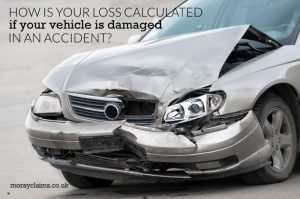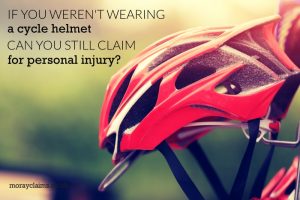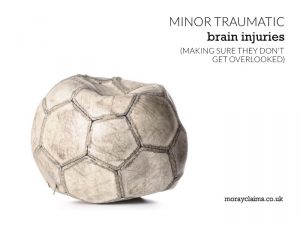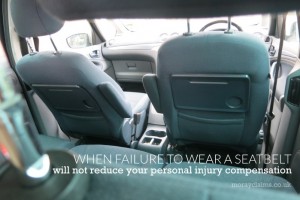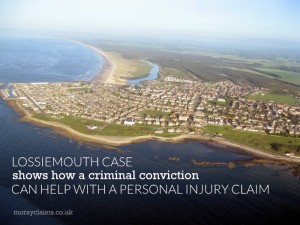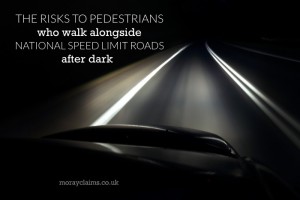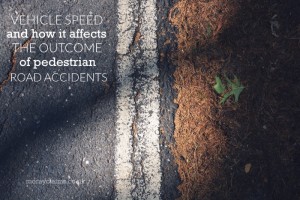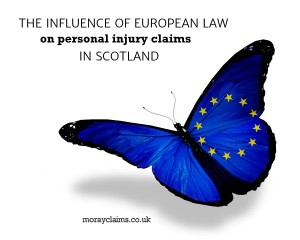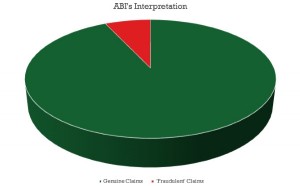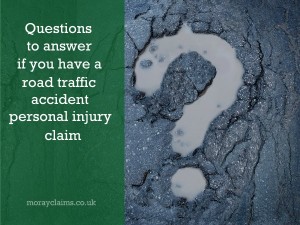Personal injury claims often result from road traffic accidents. In that context, clearly, potential claims for damage to cars will also come up. In what circumstances will a damaged car be treated as a total loss? In other words, what is the basis of calculation of the claim you can make if your car is damaged? In Scotland, the law dates back to the case of Pomphrey –v- Cuthbertson, decided in 1950. This arose out of a road accident in 1948. William Pomphrey, a newspaper proprietor from Wishaw, and his wife, Joan, made claims for personal injury compensation and losses on Mr Pomphrey’s vehicle against James A. Cuthbertson Limited, agricultural engineers. Mr Pomphrey’s Fordson commercial motor car had been damaged in the collision between the car and a Dodge motor lorry, owned by Cuthbertson and driven by one of their employees. The claim was based on vicarious liability and liability was admitted. The accident had been caused by Cuthbertson’s employee’s negligence. So Continue Reading
If you were not wearing a cycle helmet can you still claim for personal injury?
The law in the UK does not require pedal cyclists to wear a helmet. What this means is that you won’t be stopped by the police if you fail to wear a cycle helmet. You won’t be prosecuted under the criminal law. On the other hand, Rule 59 of the Highway Code categorises cyclists as vulnerable road users and advises that cyclists ‘should wear a cycle helmet which conforms to current regulations, is the correct size and securely fastened’. The Highway Code is relevant to both criminal and civil law. Claims for personal injury compensation are civil claims for damages, so the Highway Code is relevant. Many cyclists ride without a helmet. Only just over a third of cyclists using major urban roads wore cycle helmets, according to research findings of the UK’s Transport Research Laboratory in 2008. Equivalent research in Germany apparently showed that only 11 % of cyclists in towns and cities wear a cycle helmet. Cycle helmets have to comply with a European standard. This Continue Reading
Compensation for Subtle Brain Injuries
One of the most outstanding English football centre forwards of the 20th Century tells of how, in February 1941, he received his call-up papers to the Royal Air Force. After his basic training, he passed on to the course set for a wireless-operator air-gunner. His training took him to numerous places across England. Finally, he was posted to Moray where he was to have an accident which could easily (at best) have ended his footballing career before it had even begun. He takes up the story in his 1949 autobiography, “Football Is My Game”. “It was while I was at Lossiemouth that I met with the accident which nipped my “career” as a W/op.A.G. in the bud, and prevented me from being sent abroad. We were on operational training; the Wellington (bomber aeroplane) caught fire, and down we went in a dive. We finished in a fir plantation. The pilot and bomb-aimer were killed. The navigator lost a leg. I got out alive with various injuries of which the worst was a head wound Continue Reading
When not wearing a seatbelt will not reduce your personal injury compensation at all
The modern car seatbelt was invented by a former aviation engineer, whose experience included working on ejector seats. By 1959, cars had seatbelts but only two-point waist restraints. In a car accident, this often did the wearer as much harm as good. Volvo engineer, Nils Bohlin, created a design which anchored the straps low beside the seat. This meant that the geometry of the belts formed a “V” - pointing at the floor – and that the belt would remain in place and not shift under sudden loading. Such a significant advance in driver and passenger safety could have netted Volvo a fortune on the patent. Instead, they gave it away. They decided that the invention was so revolutionary that its value should not profit their company but be a free, life-saving tool. In the world of personal injury claims, if you fail to wear a seat belt and are injured in a road traffic accident, you don’t expect to be free from blame. As we’ve examined elsewhere on this website, UK personal injury Continue Reading
How a Criminal Conviction helps with a Personal Injury Claim
A personal injury claim arising from an incident which took place in a Lossiemouth pizza takeaway has provided a good example of how a criminal conviction can be used in a personal injury claim to pave the way for the claim to succeed. This is a procedural decision from the All-Scotland Personal Injury Court in Edinburgh. In this article we will consider three aspects of how a criminal conviction helps with a personal injury claim. Firstly, we will look at the law in relation to the use of criminal convictions in civil proceedings such as personal injury claims. Secondly, we will see how the reference to a criminal conviction in the Lossiemouth case helped the claimant establish that compensation should be payable to him. Finally, we will look at the question of whether it is ever possible for a person who is blamed for an accident/injury to argue their way out of it even if there is a criminal conviction against them. Continue Reading
Why Walking on National Speed Limit Roads during the Hours of Darkness is such a Bad Idea
Most of us did this experiment in school Science class. Using a 30cm ruler, one person holds it at the “30” mark and lets it hang down vertically. Their partner (person 2) puts the thumb and first finger of one hand at either side of the “0cm” mark on the ruler. Person 2’s fingers should almost touch the ruler, but not quite. Without warning, person 1 lets go of the ruler. Person 2 tries to stop the ruler’s descent as quickly as they can, by closing their finger and thumb together. You record the level (in cm), just above person 2’s finger, where the ruler was caught. You repeat the test five times and work out the average “catch distance” for the person. A conversion table allows you to translate the distance along the ruler into a reaction time, in milliseconds (thousandths of a second – i.e. one second is a thousand milliseconds). According to one such table, the first centimetre (“0cm – 1cm”) equates to 50 milliseconds. It then increases by 10 milliseconds per Continue Reading
How Speed Affects the Outcome of Pedestrian Road Accident Collisions
Escape velocity is the speed an object must reach to break the bonds of a planet’s gravitational force and get into orbit. To enter orbit around the Earth, for example, a spacecraft needs to be going at a staggering 7 miles per second (25,000 miles per hour). This creates a difficult series of connected problems. The vehicle requires a lot of fuel. Fuel adds weight. More weight means more thrust is required. Greater thrust demands more fuel. And so it goes on … Another situation where speed has a crucial effect on the outcome is in relation to pedestrian road traffic accidents. In this article, we will consider the significance of vehicle speed in pedestrian collisions. Secondly, we will consider the effect of some other factors apart from impact speed. Finally, we will look at some of the implications for measures which can be taken to improve road safety. Frontal impact collision research has considered the effect of speed. Research into road accidents involving Continue Reading
The Influence of European Law on Personal Injury Claims in Scotland
'What have the Romans ever done for us?' is one of the most quoted scenes from Monty Python's iconic film, Life of Brian. John Cleese as Reg, leader of The People's Front of Judea, poses the question at a secret meeting of the group, expecting no or few positive responses from his colleagues. This, he hopes, will reinforce the group's resolve to overthrow their 'pointless' and unwelcome rulers. Instead, their brainstormed list of the benefits of Roman occupation grows and grows, with great comic effect. Exasperated, in an effort to bring the discussion to an end, Reg snarls: 'Alright - but apart from sanitation, medicine, education, wine, public order, irrigation, roads, the freshwater system and public health ... what have the Romans ever done for us?' (The next and final answer, before the meeting is suddenly interrupted by a threatening knock on the door, is: 'Brought peace'). The serious point, well made by this film scene, is that the influence of the Roman Empire in the Continue Reading
Removing Right To Claim For Whiplash Injury Is Thin End Of The Wedge
As a bus passenger most days between Lossiemouth and Elgin, the recent unreliability of the Stagecoach service has been a regular topic of conversation. It has made me wonder how you can give an incentive to provide on-time servicing to a company with a virtual monopoly of the local bus service. How about we all get the automatic right to claim compensation from Stagecoach for our hassle and inconvenience every time a bus is more than 15 minutes late? An end to compensation for minor whiplash In his Autumn Statement for 2015, the Chancellor announced that the Westminster government intends to introduce measures to end the right to compensation for minor whiplash injuries. (We don't know yet how 'minor' is to be defined). Scotland not included Our understanding is that these proposed reforms would apply only to England and Wales (and not Scotland or Northern Ireland). However, we’re highlighting these proposals because we consider the principle to be so important. The Continue Reading
Road Traffic Accident Questions Your Solicitor Needs Answered
If you are making a personal injury claim as a result of an accident, your solicitor needs a lot of information from you at the outset. So much information, in fact, that it can be easy to overlook something important. This post contains a list of questions relevant to personal injury claims arising from road traffic accidents. A checklist like this can help to make sure your solicitor gets as much of the crucial information as possible. At the foot of the article is a link to a downloadable pdf document, which contains all the questions as a handy reference. In this type of case, it will be necessary to show that the accident was caused by fault or negligence (that is, some blameworthy or careless act or omission) on the part of the other driver. Your solicitor will want to have the following information from you, as far as possible. Road traffic accident questions to answer for your personal injury solicitor 1 Your full name, date of birth, address and telephone number, Continue Reading
Pedestrians Hit By Buses On The Pavement
An accident which happened in East Road, Elgin, Moray, has resulted in a Court of Session action for personal injury compensation. The Court of Session is the highest civil court in Scotland. The decision of the court (2015) is a useful illustration of the principles which apply when you have an accident between a bus and a pedestrian who is on the pavement at the time. Elgin bus The injured person, Ian Whyte, was a 10-year-old school boy at the time of the accident in 2008. He claimed against Bluebird Buses Limited for injuries he suffered when a bus struck him as he was standing on the edge of the kerb at the bus stop. Several young people were jostling for position near the kerb, as the bus drew in to the stop. The evidence indicated that the collision was between the near side of the bus, towards the front, and the back of the boy’s head. The impact knocked him over. However, he managed to pick himself up and get home. Much of the evidence in the case was derived from Continue Reading
Injured By An Uninsured Driver? Things You Need To Know About Claiming
If you are injured in a road traffic accident caused by the negligence of a vehicle driver, you should be able to claim against their motor insurance because it’s compulsory to have insurance. But we all know that not everyone has insurance. You only need to read local newspapers like Moray’s Northern Scot. Reports of criminal prosecutions where someone has either driven without insurance, or caused or permitted someone else to drive without insurance, are common. In this article, we consider the procedures available for you to claim compensation if you have been injured by an uninsured driver. Continue Reading
